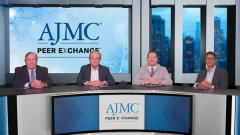
Symptoms Associated with Schizophrenia
Panelists discuss how understanding and managing the full range of schizophrenia symptoms is key to improving long-term patient outcomes.
Episodes in this series

Panelists discuss how schizophrenia presents a wide spectrum of symptoms categorized into positive, negative, and cognitive domains. Positive symptoms include hallucinations, delusions, and disorganized thinking, while negative symptoms—such as social withdrawal and reduced motivation—tend to erode long-term functioning.
Panelists discuss how cognitive symptoms, often underestimated in treatment planning, significantly impair memory, attention, and problem-solving ability. These deficits make daily life tasks challenging and often persist even when positive symptoms are controlled. The discussion underscores the necessity of comprehensive symptom management that addresses the full clinical picture.
Panelists discuss how advancements in pharmacologic and psychosocial therapies are beginning to target cognitive and negative symptoms more effectively. The panel emphasizes the role of individualized treatment plans that combine medication, therapy, and social engagement to promote recovery and reintegration.
Newsletter
Stay ahead of policy, cost, and value—subscribe to AJMC for expert insights at the intersection of clinical care and health economics.










